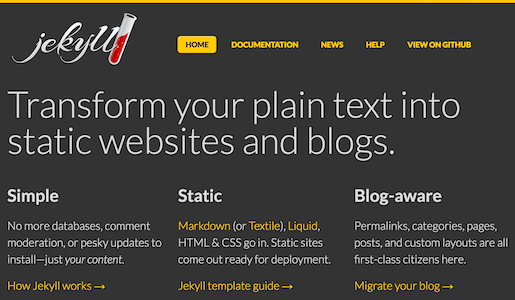4 Reasons To Leave WordPress

Do you have a WordPress website? You certainly aren’t alone. It says right on their homepage that “WordPress powers 25% of the internet”. While that statistic might be reassuring to someone who doesn’t know better, it’s actually unnerving. Let me tell you why. Then let me help you leave WordPress.
-
WordPress is expensive.
If you’re looking to get started with WordPress, then from the WordPress.org homepage you’ll likely go to the “hosting” tab to see what they recommend. #1 is Bluehost. In fact I think that was the ONLY web host recommended by WordPress.org for most, if not all, of 2015.
So off you go to the BlueHost.com plan pricing page. If you only have 1 website and you’re pretty sure it’s not going to require more than 50 GB, then you’ll see that the cheapest option is only $2.95 per month which doesn’t sound too bad. If you choose that option and go through the steps of finding a domain name and entering your contact information, you’ll soon feel that after all this effort you’ve pretty much committed to this purchase before you’re brought to the package information box and learn that you have to pay the “monthly fee” in advance. On top of that, the only way to get the price of $2.95 per month is to sign up for 3 years in advance. This brings your total to $106.20. If you check a few other boxes for domain privacy, site backup, search engine jumpstart, and security your total quickly jumps to $285.48. That’s a heavy investment for a new website, and it doesn’t even include the website!
So you go back to WordPress.org’s hosting page to see what else they recommend and click the next option, DreamHost. You just have to glance at this page to see the cheapest plan is $7.95 per month before you throw up your hands in exasperation.
-
WordPress is complicated.
From every angle, there is no simple way to describe WordPress. Even for web designers who are familiar with WordPress, making layout changes is a process. For non-experts it is an exercise in educated guesswork. The architecture consists of scripts running on a web server that talk to a database. The dashboard interface gives non-technical users a window into the technical process of creating a website. And of course there is the website itself. All of these moving parts are meant to work together smoothly, but if they aren’t set up properly and regularly updated then they can grind together angrily and force your website and all of your visitors into an uncomfortable situation. Seeing backend code on the front page of a website is like seeing a person in public who isn’t wearing pants. Trying to move that picture on your homepage just an inch to the left might make you want to tear out your hair.
-
WordPress is insecure.
The complexity of WordPress coupled with its giant user base makes it a prime target for hackers. Issues introduced into websites through complexity are so common that hackers just blend right into the mess. The large user base also means there are a lot of companies out there trying to capitalize on the market by building plugins for WordPress sites. Each additional plugin creates an additional layer of complexity and another window from which a hacker can enter your site. A hacker with access to your site can steal your data and make you untrustworthy. I bet you didn’t shop on target.com at the end of 2013 did you?
-
WordPress is slow.
When you visit a WordPress site you ask the web server to show you a page. The web server takes your request, puts you on hold while it gathers the information, and then delivers it to you. In this process it steps through a lot of junk and it gives you a lot of stuff you didn’t ask to see. If you’re lucky you might see what you asked for, but it will most certainly be handed to you with a lot of unnecessary frills. This is especially true in the “head” section of the web page where all the meta data is stored. Every new plugin likes to add several lines of code here, oftentimes duplicating the work being done by existing plugins.
What does this mean?
It means you should save that money you were going to spend on hosting and put it into the design of your website. It means you should spare your visitors their precious time and keep them from waiting on a complicated web server. It means you should choose a web designer who doesn’t use WordPress. If you’ve already invested heavily into you current WordPress site and you feel like you’ve made a mistake, I sympathize with you. I’ve been there too. I still have 2 years left on my BlueHost account. Yet even though I still have access to this web server and database, I host my site on GitHub Pages for free. My website is now much simpler and much more secure.
Don’t make the same mistake I did. Stay away from WordPress.
If you need help building your first site or if you need help migrating your existing WordPress site to a more secure platform, please contact me and ask for help.
Development view: Disqus thread goes here in production